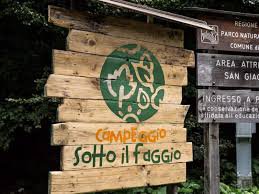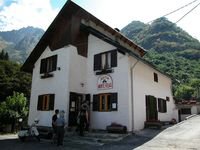
Lake Vei del Bouc
Around the shores of the lake, in addition to lovely grassy meadows on which to rest, there are also some spectacular sheepbacked boulders, evidence of the presence of glaciers in ancient times. Until recently, it was possible to see primitive incisions made on the rocks around the lake, probably of the same origin as the far more famous ones in the Valle delle Meraviglie.
4 points of interest

La Palazzina Reale di Caccia di San Giacomo - Roberto Pockaj  History and historical trail
History and historical trailThe former Royal Hunting Lodges
The two large buildings, now owned by religious groups, are said to have been built between 1865 and 1870 at the behest of Vittorio Emanuele II, to be used during his sojourns in the Royal Hunting Reserve. The one on the left, with its attractive portico decorated in horizontal stripes with the colors of the House of Savoy, was the residence of the royal entourage, while the other housed the stables.
The stables were then given to the army, which expanded the building between 1897 and 1898, transforming it into the Princess Elena barracks.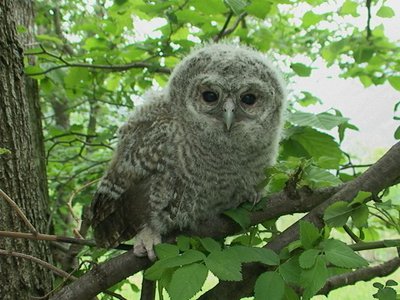
Allocco - Augusto Rivelli  Fauna
FaunaThe tawny owl
Among nocturnal birds of prey, the owl plays an important role, both from an ecological point of view and in the human imagination. It is in fact one of the most widespread species and therefore responsible for controlling the populations of rodents in wooded areas. For our part, often confused with the owl due to its shrill calls, it has a typical song that anyone recognizes: the typical mournful owl song. It can be recognized from owls and owls by the color of its eyes: the iris is completely dark.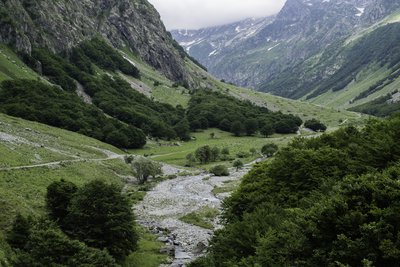
PIAN DEL RAZUR - gianluca.giordano  Geology
GeologyThe Pra del Rasur
The ample meadow of the Pra del Rasur was formed towards the end of the last Ice Age, when rockslides from both sides of the valley blocked the course of the torrent. The detritus carried by the torrent itself, still quite impetuous today, gradually filled up the basin that was formed, thus creating the flat area.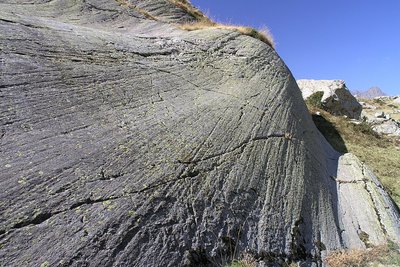
Le rocce montonate, uno dei segni più evidenti della presenza dei ghiacciai in epoche passate - Roberto Pockaj  History and historical trail
History and historical trailPrehistoric petroglyphs
Until recently, some petroglyphs were traceable on the rocks around the lake. The subject of an investigation by the Archaeological Superintendency of Piedmont in the years 1989/90, engravings depicting horns, weapons and geometric figures were identified. They should be attributable to the much more famous and numerous ones of nearby Monte Bego, and date back to the second half or end of the 4th millennium BC.
Today they have virtually disappeared.
Description
A few dozen meters downvalley from San Giacomo di Entracque (1209 m), the track crosses a bridge over the Gesso della Barra torrent. Passing by the picnic grounds and the turnoff for Ponte della Rovina and Trinità di Entracque on the left, the route follows the paved road, closed to private traffic, that crosses through woods full of magnificent beeches and firs before coming to the former Royal Hunting Lodge and the Principessa Elena barracks, which now serve as lodgings for summer camps and are owned by religious groups.
Behind them (fountain), the road becomes unpaved as it penetrates the Vallone di Moncolomb, climbing up in switchbacks, still through shady beech woods. After a long tract in the woods, having passed by several secondary paths and turnoffs (mostly shortcuts), the track passes by the humble Gias dell'Aiera (1342 m, 30 minutes from San Giacomo), the point of departure of an old mule track used by Savoy hunting parties. The route continues on the unpaved road, which, when it levels off, comes to the mouth of the Pra del Rasur.
Passing by the old (and not easy to spot) mule track on the left for the Vallone Frassinetto, the track emerges from the woods and also passes by the short extension to the Gias del Rasur on the left.
The dirt track descends into the broad pasture meadow below and runs through it on the orographic right of the torrent until reaching its end at the ruins of the lower Gias del Vei del Bouc (1437 m, 40 minutes from the Gias dell'Aiera).
Near the ruins of the gias the dirt road ends at a fork, and two mule tracks diverge: the one on the right leads to the Pagarì Refuge, but the route follows the track on the left, for Lake Vei del Bouc.
The mule track climbs gradually up the slope on the side of the valley in a series of switchbacks, passing through a copse of beeches twice before reaching the mouth of the Vallone del Vei del Bouc.
Following the footpath, the route traverses to the southeast, crosses a brook and begins to climb again in a very long series of broad switchbacks up the sun-kissed slope.
At an altitude of about 1840 m, where a switchback veers left, the route leaves the original path, obstructed by a rockslide, and follows a recently cleared trail to the right. The trail, which stays close by the torrent that spills out of the lake, snakes uphill among grassy slopes and detritic rubble before rejoining the old mule track followed previously.
The route follows the track to the right, and comes to a turnoff after just a few meters: veering off the main path leading to Colle del Vei del Bouc, the route takes the turnoff to the right and crosses the footbridge over the torrent spilling out of the lake. After a couple of turns on the mule track, which reappears at this point, the route comes to the basin of Lake Vei del Bouc (2042 m, 2 hours from the lower Gias del Vei del Bouc).
There is a Park Service building in the meadow near the lake.
- Departure : San Giacomo di Entracque (1210 m)
- Arrival : Lake Vei del Bouc (2042 m)
- Towns crossed : Entracque
Altimetric profile
Recommandations
Transport
SNCF line TER Provence Alpes-Côte d'Azur For travel in the PACA region and towards Cuneo www.ter-sncf.com/pac
Trenitalia for travel in the Piedmont region https://www.trenitalia.com/it.html
Access and parking
From Borgo San Dalmazzo drive up the Valle Gesso. After passing Valdieri, turn left for Entracque. Before entering the town, turn right for San Giacomo and then right again for San Giacomo. There is a parking fee in the summer season.
Parking :
Report a problem or an error
If you have found an error on this page or if you have noticed any problems during your hike, please report them to us here:
Close by2
- Mountain Hut
Mountain Hut
Rifugio escursionistico S. Giacomo e Baita Monte Gelas
Structure open only in the summer season.
The Baita Monte Gelas was born in 1953 thanks to Giovanni Gerbino and Caterina Mellano. Since then our family has been offering hospitality and refreshments to visitors to the upper Gesso Valley.

